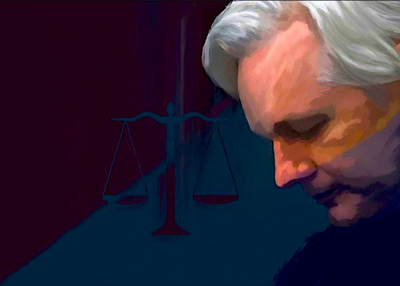Assange’s Father Says His Son Has Been Vaccinated
John Shipton also told a French interview program that too much focus was on Julian Assange and not enough on the crimes WikiLeaks has revealed.

All Global Research articles can be read in 51 languages by activating the “Translate Website” drop down menu on the top banner of our home page (Desktop version).
To receive Global Research’s Daily Newsletter (selected articles), click here.
Visit and follow us on Instagram at @crg_globalresearch.
***
Julian Assange’s father, John Shipton, has told a French interviewer that his son has been given a Covid-19 vaccine in Belmarsh Prison.
“He has been vaccinated, of course,” Shipton told the show Thinkerview, live-streamed on Monday. “So he has no choice in this. No choice about anything. He has no control over his body.”
Shipton said every medicine Assange accepted in prison would go on his record and wind up in court. Likewise any medicine he refused would also be reported.
There is “not a mandated Vax” in the prison, Shipton told Consortium News in an email. “I was attempting to illustrate that Julian’s body is not under his control. All actions, as I understand it, are noted and available to [the] prosecution. The psychiatric staff and medical staff write reports which are available.”
Shipton told CN that “if [the] Vax [is] not taken, I presume prison administration, no less than other institutions …” would report it. “Thus a freedom which in practice does not exist,” he said.
Shipton told the French interviewer: “He only has choice about what he might think about from this minute to the next minute. What his thoughts are, are his. The rest is in the complete control of the jail administration because it is a maximum security prison. Everything … is supervised. ”
According to testimony at his September 2020 extradition hearing, Assange had been reluctant to discuss his health with prison doctors, fearing he would be put in isolation.
The imprisoned WikiLeaks publisher has a chronic lung condition. His block at Belmarsh had an outbreak of the virus last year and was locked down.
Assange has said nothing on the record either way about vaccines or public health measures like lockdowns or wearing masks. He has been incommunicado directly with the public since Ecuador shut off his internet connection in March 2018 inside its embassy in London where Assange had been granted political asylum in 2012.
In August, the U.K. Ministry of Justice told Consortium News in an email that a vaccine was made available to all inmates at Belmarsh Prison, where Assange has been held since April 2019. He remains there on remand pending the U.S. appeal of a judgement not to extradite him.
“All prisoners have been offered a vaccine,” wrote MoJ senior press officer Sarah Fairely. “As it is a personal health matter we don’t hold the figures on those who have taken the vaccine.”
In July, Insidetime, a British newspaper for prisoners, reported that more than 50 percent of prisoners in U.K. jails had refused a Covid-19 vaccine.
“At four London prisons – Wandsworth, Belmarsh, Thameside and Isis – a total of 2,722 men had been offered the vaccine by early June, of whom 1,254 (46 per cent) turned it down,” the newspaper reported.
Without saying a word about vaccines, Assange has been swept up in the contentious issue, which has divided parts of his supporters. Some Assange backers have made their support for him visible at anti-lockdown and anti-vaccine protests.
Courting France
Shipton spent the majority of the interview making his case to France to help his son. He praised the French who “since the Bastille fell” have been among the most politically aware and active people in the world.
Thirty-nine deputies in the French parliament recently called for France to offer diplomatic asylum to Assange.
In the interview Shipton shifted the focus away from his son and onto the immense crimes that Assange’s work at WikiLeaks had uncovered. “Everyone focuses on Julian Assange, not the seven million people [in the war on terror] who are slaughtered, not the pall of grief that hangs like a dark cloud over the entire Middle East,” Shipton said.
He spoke of one release in the Diplomatic Cables, in which a U.S. military unit entered a house in Iraq and massacred the entire family inside. A cable describes how the soldiers, realizing they had committed a crime, called in an airstrike to entirely destroy the house and all the evidence inside.
That incident led the Iraqi Parliament to not support the renewal of the government’s status of forces agreement with the U.S.
“A revelation stopped a war,” Shipton said.
*
Note to readers: Please click the share buttons above or below. Follow us on Instagram, @crg_globalresearch. Forward this article to your email lists. Crosspost on your blog site, internet forums. etc.
Joe Lauria is editor-in-chief of Consortium News and a former U.N. correspondent for The Wall Street Journal, Boston Globe, and numerous other newspapers. He was an investigative reporter for the Sunday Times of London and began his professional work as a 19-year old stringer for The New York Times. He can be reached at [email protected] and followed on Twitter @unjoe
Featured image is from Lawyers for Assange

